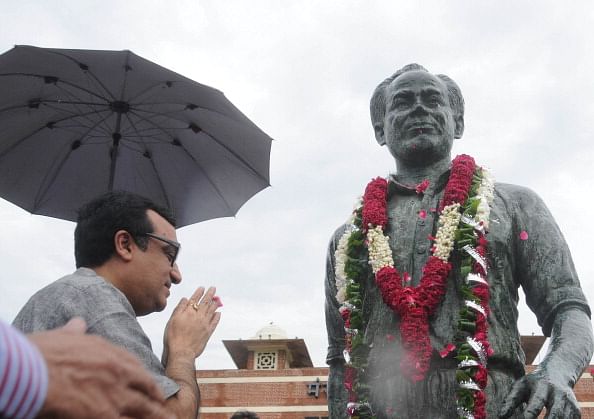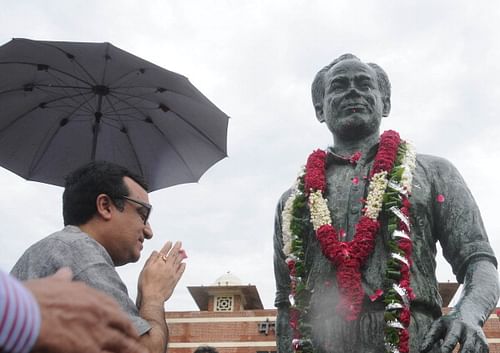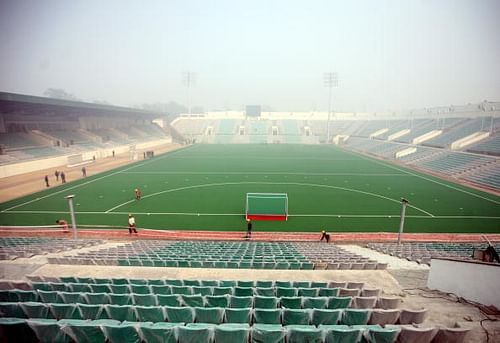
Hockey's Immortal: Dhyan Chand

“It’s amazing that a man who is dead can talk to people through these pages. As long as his book survives, his ideas live.” - Christopher Paolini Eragon.
Ages ago, some nine decades back, the world was a mere witness to kingdoms and dynasties; kings and emperors. The less we talk about those reigns, the simpler it would be. Sports and games, often tokens of never-ending battles, were considered as festivals taking place on a world stage. The Olympics were the most joyous sporting spectacles. It’s no wonder that entire nations took immense pride in them, including India.
A decent travel in the sub–continent, surpassing the cities, arriving at the thresholds of towns and those picturesque tiny hamlets and you see the scenes of kids: holding aloft a stick, bent slightly near its end, pushing the ball into the cage which is often guarded.
You’ve probably guessed by now. Yes, I’m talking about hockey.
We Indians are truly indebted to it, for it not only taught the world the game, but also produced the most legendary characters the game has ever been witness to. To name a few: Leslie Claudius, Kishan Lal, Shankar Lakshman, K.D.Singh Babu, and many more such names in this list. In this article of mine, I’d like to extol the virtue of a man who even managed to baffle Hitler: ‘The Wizard of Hockey’, Dhyan Chand.
Bengal was nearing its partition in those pre–independence days and all that was needed for the Almighty was to send a jewel to planet Earth on the 241st day of 1905, a historic Tuesday, in the form of Dhyan Chand; a name which every Indian would utter with pride. Though his first love was wrestling, an interest in hockey started taking shape in due course of time.
His skill lay in his shoulders, which only but needed a stick to baffle his peers and contemporaries on the hockey field. His control over the ball was immense; so much so, that he could dribble the ball beneath the grass, surpassing many a defender in his path to complete the formalities of a goal.
An anecdote surrounds his name. The word “Chand”, in Hindi actually means ‘the moon.’ He used to practice and play the game at nights, after his services in the day. Since those were pre-electricity times and the moon was the prime source of light, this legend used it to harness his skills.
The flawless control over the ball, those mesmerizing stick works of this center forward are unparalleled. In other words, he was a selfless goal machine. If he in his run to the cage sensed a scoring chance to either of the winger, he would humbly pass the ball. He meant to win, and win with pride. On an even close look at his game, I wonder if there were any magnetic properties in his stick! So gracious was his control.

NEW DELHI, INDIA – JANUARY 24: A view of the newly renovated Dhyan Chand National Hockey Stadium in New Delhi on January 24, 2010.
As far as the Olympics go, no can one forget that match against the USA at Los Angeles in 1932, where India won 24-1.
Believe you me, he scored 8 goals in that match, helping contribute to the game a world record for the highest margin of victory, which still stands. He scored a whopping 133 goals out of India’s 338 that year. But the best was saved for the 1936 Berlin games. It was just a goal-fest, as India reached the finals against Germany after sneaking past Hungary, USA, Japan and France. After the first match, the German literary press wrote: “The Olympic complex now has magic two.”
But things did not augur well for this man in the finals, which were played under the watchful eyes of Hitler.
The Germans could do nothing but attack physically. However, after a few initial hiccups, this brave heart defied the odds, pushed upwards and brought us a gold medal.
In his autobiography, ‘The Goal’, he wrote, “When Germany was four goals down, a ball hit Allen’s pad and rebounded. The Germans took full advantage of this and made a rush, netting the ball before we could stop it. That was the only goal Germany would score in the match against our eight, and incidentally the only goal scored against India in the entire Olympic tournament. India’s goal-getters were Roop Singh, Tapsell and Jaffar with one each, Dara two and I three.”
On a trip to Adelaide in 1935, the cricketing great Sir Don Bradman said, “He scores goals like runs in cricket.”
He was a triple Olympic gold medalist, one each at the 1928, 1932 & 1936 games. His autobiography, ‘The Goal‘, is a must read.
We cannot estimate the amount of respect of those residents of Vienna, who built a statue of him with four hands and four sticks, and those of the Londoners, who renamed one of the tube stations after him as a mark of respect and tribute. Truly, Dhyan Chand’s impact on the world is beyond measure.
And after all the years of priceless service, Dhyan Chand retired from army as a Major and spent his days passing on his wisdom.
As all things must come to an end, on a fateful Monday, the 3rd of December in 1979, this legend left for heavenly abode. He was cremated at the Jhansi Heroes ground with full military honour from the Punjab regiment.
If his games were ever recorded, the videos would serve as the best coaching manuals.
The national stadium in Delhi was named after him; a Padma Bhushan was awarded in 1951 and even the nation’s highest sporting civilian award is named after him. In an era where most people would not even know that his birthday is celebrated as the national sports day, we, in the hockey circles expect him to be remembered as a man whose untold, audacious, and fearless narrations on a hockey field with his magical stick have become folklore in the sporting history of the world.
Of all, our Dhyan Chand is “The Wizard”, “The Patois”, and “The Immortal” of Hockey.